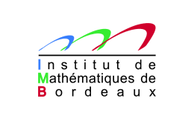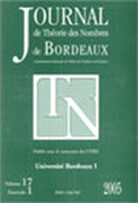CONFERENCE
Zeta Functions
Fonctions Zêta
2 – 6 December 2019
Zeta Functions
Fonctions Zêta
2 – 6 December 2019
|
Scientific Committee
Comité scientifique Georges Comte (Université Savoie Mont Blanc) |
Organizing Committee
Comité d’organisation Cécile Armana (Université de Franche-Comté) |
Description
|
Zeta functions are ubiquitous objects in Number Theory and Arithmetic Geometry. They are analytic, algebraic, or combinatorial in nature. Families of zeta functions (or more generally of L-functions) naturally appear in a broad variety of active research fields e.g. au- tomorphic forms and Artin representations, Drinfeld modules, arithmetic dynamics, abelian varieties over global fields, inequities in the distribution of sequences indexed by prime num- bers or more generally by places of global fields…
The main purpose of the “Zeta functions” conference is to gather experts of the theoretical and computational branches of number theory and arithmetic geometry together with students and young researchers to have them interact and explore further the richness of the information encoded by zeta and L-functions. Our conference proposal aims at synthesizing complementary points of view coming from distant fields: the analytic approach in the classical theory of zeta and L-functions, the theory of Artin L-functions in connection with the Langlands program, zeta and L-functions coming from arithmetic geometry in the spirit of the Weil conjectures, zeta functions arising in dynamics… One of the original aspects of the project lies in the interaction between theoretical considerations and numerical and algorithmic features for diverse families of zeta and L-functions. Rather than a meeting meant for experts in a particular topic we will put the emphasis on the exchange of ideas between people coming from related fields in Number Theory and on inviting young researchers and students to further pursue the study of these interactions that have already proven fruitful and that we believe are still very promising. |
Les fonctions zêta sont des objets omniprésents en théorie des nombres et en géométrie arithmétique. Ce sont des fonctions de nature analytique, algébrique ou combinatoire. De telles familles de fonctions zêta (ou plus généralement de fonctions L) apparaissent naturellement dans des domaines variés et très actifs de la recherche actuelle : mentionnons la théorie des formes automorphes et les représentations d’Artin, les modules de Drinfeld, la dynamique arithmétique, les variétés abéliennes sur des corps globaux, le biais dans la distribution de suites indexées par des nombres premiers…
L’objectif principal de la conférence ≪ Fonctions zêta ≫ est de réunir des experts des aspects théoriques et algorithmiques de théorie des nombres et de géométrie arithmétique, ainsi que des étudiants et de jeunes chercheurs pour faire en sorte qu’ils puissent interagir et explorer davantage la richesse des informations encodées par les fonctions zêta et par les fonctions L. Cette conférence sera l’occasion de proposer la synthèse de points de vue complémentaires issus d’approches techniquement très différentes (approche analytique classique, approche via les fonctions L d’Artin sous l’impulsion entre autres du programme de Langlands, approche provenant de la géométrie arithmétique moderne suivant les conjectures de Weil, approche dynamique…). Un des aspects originaux de notre initiative réside dans l’interaction entre considérations théoriques et algorithmiques des diverses fonctions zêta et fonctions L qui seront considérées. Les systèmes de calcul formel ont connu ces dernières années un développement et des améliorations remarquables. Ils sont plus que jamais des outils précieux pour tester des hypothèses, suggérer des heuristiques, et fournir à la communauté un moyen facile, puissant, et effectif pour l’activité quotidienne du chercheur en mathématiques. Plus qu’une réunion d’experts d’un domaine donné, la conférence « Fonctions zêta » mettra l’accent d’une part sur l’échange des idées entre chercheurs issus de spécialités proches en théorie des nombres et incitera d’autre part les jeunes chercheurs et les étudiants à étudier plus avant ces interactions dont l’intérêt et l’efficacité ont déjà fait leurs preuves et dont nous pensons qu’elles demeurent prometteuses. |
SPEAKERS
Olga Balkanova (Russian Academy of Sciences) Averages of Zagier L-functions
Dimitrios Chatzakos (Université de Lille) Quantum ergodicity and the Prime geodesic theorem on 3-manifolds
Raf Cluckers (CNRS Université de Lille) Exponential sums modulo powers of primes, singularity theory, and local global principles
Cécile Dartyge (Université de Lorraine) On the distribution in arithmetic progressions of the summands of the partitions of the integers
Kévin Destagnol (IST Austria) Sur le nombre de points de degré donné et de hauteur bornée via la fonction zêta des hauteurs
Lucile Devin (Université de Montréal) Low-lying zeros in a family of holomorphic cusp forms
David Feutrie (Université de Lorraine) Cribler par une progression arithmétique
Arthur Forey (ETH Zürich) Bounded integral and the Denef-Loeser motivic zeta function
Joseph Gunther (Université Paris-Sud) tba
Adam Harper (University of Warwick) The Riemann zeta function in short intervals
Peter Humphries (University College London) Small Scale Equidistribution of Lattice Points on the Sphere
Oleksiy Klurman (KTH Royal Institute of Technology) Boundary-adapted arithmetic random waves and spectral semi-correlations
Alexandre Lartaux (Institut de Mathématiques de Jussieu-Paris Rive gauche) Oscillations localized on divisors
Youness Lamzouri (Université de Lorraine) Zeros of Epstein zeta functions off the critical line
Jungwon Lee (UNIST South Korea) Dynamics of continued fractions and conjecture of Mazur-Rubin
Alexander Mangerel (Université de Montréal) Discrepancy Problems for Multiplicative Functions in Number and Function Fields
Djordjo Milovic (University College London) 8-rank and the negative Pell equation
Marc Munsch (TU Graz) Small GCD sums
Corentin Perret-Gentil (ETH Zürich) Generic linear independence of roots of L-functions attached to exponential sums, and consequences on distributions
Mark Pollicott (University of Warwick) Dynamical zeta functions and their applications
Marine Rougnant (Université de Franche-Comté) On some p-rational number fields of low degree
Ari Shnidman (Hebrew University of Jerusalem) Monogenic cubic fields and local obstructions
Anders Södergren (Chalmers University of Technology) On Epstein’s zeta function and related random functions
Cathy Swaenepoel (Université de Montréal) Prime numbers with preassigned digits
Olga Balkanova (Russian Academy of Sciences) Averages of Zagier L-functions
Dimitrios Chatzakos (Université de Lille) Quantum ergodicity and the Prime geodesic theorem on 3-manifolds
Raf Cluckers (CNRS Université de Lille) Exponential sums modulo powers of primes, singularity theory, and local global principles
Cécile Dartyge (Université de Lorraine) On the distribution in arithmetic progressions of the summands of the partitions of the integers
Kévin Destagnol (IST Austria) Sur le nombre de points de degré donné et de hauteur bornée via la fonction zêta des hauteurs
Lucile Devin (Université de Montréal) Low-lying zeros in a family of holomorphic cusp forms
David Feutrie (Université de Lorraine) Cribler par une progression arithmétique
Arthur Forey (ETH Zürich) Bounded integral and the Denef-Loeser motivic zeta function
Joseph Gunther (Université Paris-Sud) tba
Adam Harper (University of Warwick) The Riemann zeta function in short intervals
Peter Humphries (University College London) Small Scale Equidistribution of Lattice Points on the Sphere
Oleksiy Klurman (KTH Royal Institute of Technology) Boundary-adapted arithmetic random waves and spectral semi-correlations
Alexandre Lartaux (Institut de Mathématiques de Jussieu-Paris Rive gauche) Oscillations localized on divisors
Youness Lamzouri (Université de Lorraine) Zeros of Epstein zeta functions off the critical line
Jungwon Lee (UNIST South Korea) Dynamics of continued fractions and conjecture of Mazur-Rubin
Alexander Mangerel (Université de Montréal) Discrepancy Problems for Multiplicative Functions in Number and Function Fields
Djordjo Milovic (University College London) 8-rank and the negative Pell equation
Marc Munsch (TU Graz) Small GCD sums
Corentin Perret-Gentil (ETH Zürich) Generic linear independence of roots of L-functions attached to exponential sums, and consequences on distributions
Mark Pollicott (University of Warwick) Dynamical zeta functions and their applications
Marine Rougnant (Université de Franche-Comté) On some p-rational number fields of low degree
Ari Shnidman (Hebrew University of Jerusalem) Monogenic cubic fields and local obstructions
Anders Södergren (Chalmers University of Technology) On Epstein’s zeta function and related random functions
Cathy Swaenepoel (Université de Montréal) Prime numbers with preassigned digits
SPONSORS







